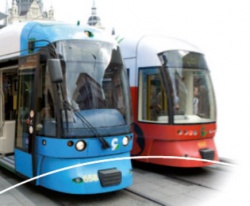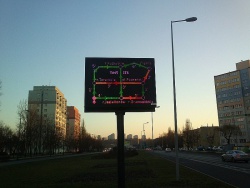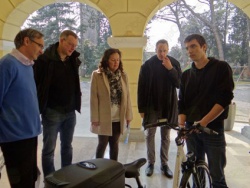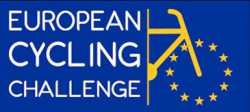Best practices (mobility)
Contents
- 1 Introduction
- 2 List of best practices
- 2.1 BENEFIT (Advanced Measures for Companies to Increase Public Transport Use of their Employees)
- 2.2 SUMO (Sustainable Mobility Data Integration and Analysis)
- 2.3 Intelligent Transport Systems
- 2.4 Use of electric bikes in Municipality of Šempeter-Vrtojba
- 2.5 European Cycling Challenge
- 2.6 WeCity App
- 3 Conclusions
- 4 Conclusions
Introduction
The best practices serve as a showcase of good examples and should be a first step to acknowledgment of new solutions.
The section includes solutions and best practices that are in line of the Toolkit focus and relate to mobility, transport and traffic themes.
Best practices are comprised of the following resources:
- best practices that were collected from project partners, who identified them basing upon their experience they had from their region (project deliverable D.T1.1.1).
- best practices that are actually implemented by CitiEnGov Project partners and were collected during study visits in CitiEnGov regions.
- accomplishments that arrived from synergies of CitiEnGov project partners and existing European initiatives, projects and platforms that have a focus on renewable energy sources and energy efficiency.
List of best practices
BENEFIT (Advanced Measures for Companies to Increase Public Transport Use of their Employees)
Location
Bologna, Italy
Description
BENEFIT was designed to help companies (public and private) and their employees make the switch from private car to public transport by using awareness raising activities and highlighting the advantages of public transport. BENEFIT was implemented in 7 cities where local working groups, consisting of traffic experts and representatives of public transport operators, were established. The goal was to create sustainable strategies for using public transport. Awareness raising activities were planned and selected according to an efficient strategy:
- Inform about public transport.
- Motivate and give incentives to new and existing public transport users.
- Organize necessary improvements and new services.

|
Link and contacts
http://ec.europa.eu/energy/intelligent/projects/en/projects/benefit
SUMO (Sustainable Mobility Data Integration and Analysis)
Location
Bologna, Modena, Ferrara, Reggio Emilia in Italy and Valencia in Spain
Description
The project aims at evaluating financial sustainability and technical feasibility of a service that integrates and analyses the data collected by the different sustainable mobility initiatives run by cities and supports the implementation and monitoring of Sustainable Urban Mobility Plans (SUMPs). The challenge is that current ICT-based mobility initiatives (apps, sensors) generate geolocated data, which is mostly left unused. That is due to the cost of the analysis effort, especially because data comes from different service providers and in different formats. The project involves pilot cities: Bologna, Modena, Ferrara, Reggio Emilia (Italy) and Valencia (Spain), where it will be identifying needs, business exploitation opportunities and developing a prototype solution for data integration and analysis.
Link and contacts
http://www.climatekicemiliaromagna.it/progetti/projects/sumo
Intelligent Transport Systems
Location
City of Bydgoszcz, Poland
Description
The Intelligent Transport System introduced in the City of Bydgoszcz is state-of-the-art transport control system. It is able to steer the traffic with vision-based monitoring, giving information on stops, parking spaces and navigating vehicles to alternative roads if necessary.

|
Link and contacts
Use of electric bikes in Municipality of Šempeter-Vrtojba
Location
Municipality of Šempeter-Vrtojba, Slovenia
Description
Local Energy Agency GOLEA has obtained electric bicycles within the frame of Alterenergy project (IPA Adriatic) and gave them in use to 4 municipalities of region Primorska (Pivka, Divaca, Miren Kostanjevica and Šempeter Vrtojba). In the last stated municipality Šempeter Vrtojba, the bicycles are in use by public administrators (1 bike for municipal administrators, 1 bike to intemunicipal administration unit, 1 bike to Public Institution for Culture, Sports, Tourism and Youth of Šempeter -Vrtojba). Electric bikes are the most appropriate means of travelling for short-distance use and great replacement of car use. Besides that, bicycles are mostly convenient for city driving and from economic point of view. The motor assistance can help the rider go further than they would under their own power.

|
Link and contacts
European Cycling Challenge
Location
Several municipalities across Europe, starting from 2012 every year
Description
The European Cycling Challenge – ECC is an urban cyclists' team competition taking place every May, 1-31. Born from an idea of the city of Bologna as a small pilot with around 70 people, the ECC is now one of the biggest European cycling events: during the 2016 edition, 52 cities from 17 Countries joined the Challenge, and 46.000 people cycled 4.000.000 km in a month. The gamification approach turns trips into fun activities, encouraging people to use bicycle as much as possible: participants tracks their bike-trips with a free tracking App contributing to their Team mileage, and through online leaderboards they can check their City Team position in real-time. Furthemore, the ECC makes cyclists valuable producers of data themselves. All collected GPS data have a priceless value for city planners. Ready-to-use bike-trips heatmaps, which give a first glance of the cyclists’ behaviour, deeper analysis on origins/destinations, loose of time at intersection, possible congestion on cycle lanes, etc., the knowledge of where and when cyclists ride in the city gives city planners detailed feedback about cyclists' real needs. Being part of the ECC makes cyclists active actors in the planning process: they know that thanks to information they provide through their trips, they can influence the cycling network, because it may be planned on their real needs.

|
Link and contacts
WeCity App
Location
Several municipalities (and private companies) in Italy
Description
WeCity is an app that rewards the user when he chooses sustainable mobility options to move around. The app measures the amount of Km covered while using a bike, a public mean of transport or while sharing a carpooling and converts it into credits for the user to be used in the App's store. The CO2 emissions saved by the use of sustainable mobility solutions via WeCity are validated by an international certifying organization and can be traded in the CO2 emissions market. The App creates a fruitful synergy between users and public bodies sustaining the initiative. Public bodies have to provide some kind of rewards in the App's store but they get the opportunity to sell the certified saved CO2 in the certification market and they have access to citizen mobility data for planning purposes.

|
Link and contacts
Conclusions
xxxxxxxx
Conclusions
aaaa